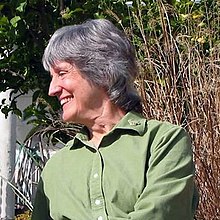Donna Haraway | |
|---|---|
 Donna Haraway (2006) | |
| Born | Donna Jeanne Haraway September 6, 1944 |
| Spouses |
|
| Awards | J. D. Bernal Award, Ludwik Fleck Prize, Robert K. Merton Award, Wilbur Cross Medal |
| Academic background | |
| Alma mater | Yale University, Colorado College |
| Influences | Nancy Hartsock, Sandra Harding, G. Evelyn Hutchinson, Robert Young, Gregory Bateson |
| Academic work | |
| Discipline | Zoology, biology, science and politics, technology, feminist theory, medicine studies, animal studies, animal-human relationships |
| Main interests | Feminist studies, ecofeminism, posthumanism |
| Notable works | A Cyborg Manifesto, Primate Visions: Gender, Race, and Nature in the World of Modern Science, Staying with the Trouble, "Situated Knowledges: The Science Question in Feminism and the Privilege of Partial Perspective" |
| Notable ideas | Cyborgs, cyborg feminism, cyborg imagery, primatology, cross species sociality |
| Part of a series on |
| Anthropology of nature, science, and technology |
|---|
| Social and cultural anthropology |
Donna J. Haraway is an American professor emerita in the history of consciousness and feminist studies departments at the University of California, Santa Cruz, and a prominent scholar in the field of science and technology studies. She has also contributed to the intersection of information technology and feminist theory, and is a leading scholar in contemporary ecofeminism. Her work criticizes anthropocentrism, emphasizes the self-organizing powers of nonhuman processes, and explores dissonant relations between those processes and cultural practices, rethinking sources of ethics.[2]
Haraway has taught women's studies and the history of science at the University of Hawaii (1971-1974) and Johns Hopkins University (1974-1980).[3] She began working as a professor at the University of California, Santa Cruz in 1980 where she became the first tenured professor in feminist theory in the United States.[4] Haraway's works have contributed to the study of both human–machine and human–animal relations. Her work has sparked debate in primatology, philosophy, and developmental biology.[5] Haraway participated in a collaborative exchange with the feminist theorist Lynn Randolph from 1990 to 1996. Their engagement with specific ideas relating to feminism, technoscience, political consciousness, and other social issues, formed the images and narrative of Haraway's book Modest_Witness for which she received the Society for Social Studies of Science's (4S) Ludwik Fleck Prize in 1999.[6][7] She was also awarded the American Sociological Association's Section on Science, Knowledge and Technology's Robert K. Merton award in 1992 for her work Primate Visions: Gender, Race, and Nature in the World of Modern Science.[8] In 2017, Haraway was awarded the Wilbur Cross Medal, one of the highest honors for alumni of Yale University.[9] In 2021, Haraway received the Nuevo León Alfonso Reyes Prize for imagining new horizons for the fusion of science, humanities, biology, and philosophy.[10]
- ^ Vasseghi, Laney. "Haraway, Donna". encyclopedia.com. Retrieved February 22, 2022.
- ^ Connolly, William E. (2013). "The 'New Materialism' and the Fragility of Things". Millennium: Journal of International Studies. 41 (3): 399–412. doi:10.1177/0305829813486849. S2CID 143725752.
- ^ "Donna Haraway". The European Graduate School. Retrieved 2021-03-03.
- ^ "Feminist cyborg scholar Donna Haraway: 'The disorder of our era isn't necessary'". The Guardian. 2019-06-20. Retrieved 2021-03-03.
- ^ Kunzru, Hari. "You Are Cyborg", in Wired Magazine, 5:2 (1997) 1-7.
- ^ Randolph, Lynn (2009). "Modest Witness". lynnrandolph.com. Archived from the original on 2014-11-13. Retrieved 23 December 2016.
- ^ "4S Prizes | Society for Social Studies of Science". www.4sonline.org. Archived from the original on 2017-10-09. Retrieved 2017-03-16.
- ^ "Science, Knowledge, and Technology Award Recipient History". American Sociological Association. 2011-03-08. Retrieved 2021-10-20.
- ^ "Yale Graduate School honors four alumni with Wilbur Cross Medals". Yale Graduate School of Arts and Sciences. 2017-10-24. Archived from the original on 2022-10-11. Retrieved 2023-09-21.
- ^ "Tec participates in award recognizing writer Donna Haraway". conecta.tec.mx. Retrieved 2024-09-18.